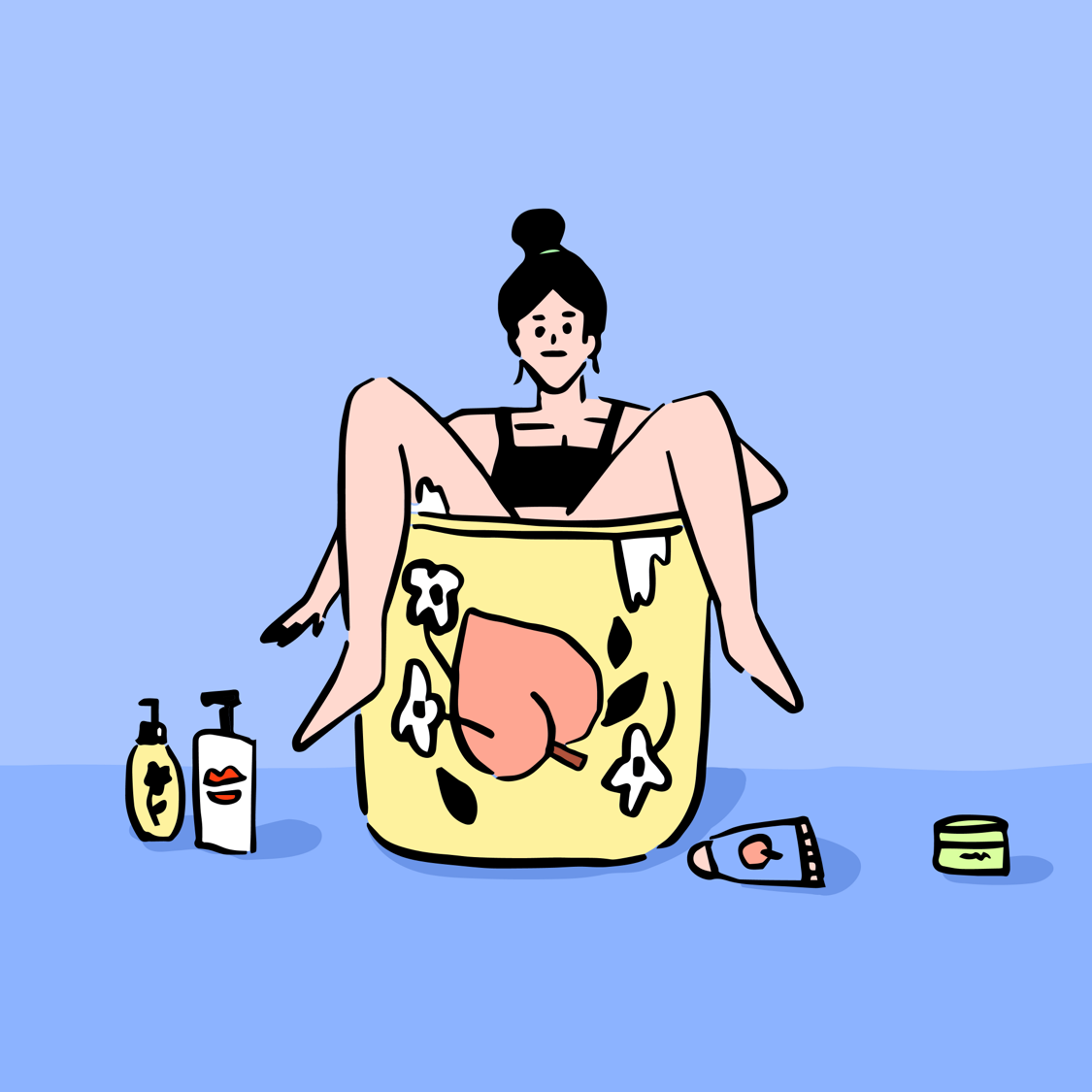Objectives
Over time companies selling products for women have found the most effective sales strategy. It’s taking advantage of women’s ‘guilt’. Companies guilt women into using their products through excuses such as hygiene and self-care. The ideal woman they portray maintains a slim body by eating diet foods and uses long-lasting makeup that doesn’t budge in any situation. They even claim that a woman's genitals should be ‘fragrant’.
Vulva Cleansers and Your Body
Let’s first examine the expression, ‘feminine wash’. The expression suggests a product that will ensures femininity through washing. As if this product will allow you to become a ‘truly clean woman’. However, the feminine washes that we commonly see in stores are actually cleansers for the ‘vulva’, the outer area of the vagina. They differ from vaginal tablets and douches used inside of the vagina. This will be further explained later but a specific cleanser is not essential when cleaning our vulva! Rather than feminine washes, they should really be referred to as ‘Vulva Cleansers’.
Usage of Vulva Cleansers
According to a survey conducted by the Korean Women’s Environmental Network in 2020, 59.5% of 1,800 women use vulva cleansers, which is six out of ten women.
Looking at this by age, 70.4% of women in their 30s, 55.6% of women in their 20s, and 53.6% of women in their 40s responded they use a vulva cleanser. 32.5% of women in their teens, which had the lowest percentage, indicated that they use a vulva cleanser.
Surprisingly, the percentage that stated a vulva cleanser is “not needed” was highest amongst respondents with a better understanding of genitals and sex at 40.3%. On the other hand, only 9.1% of those with less knowledge about genitals and sex responded that a vulva cleanser is “not needed.”
Fact or Fiction About Vulva Cleansers
Advertisements for vulva cleansers imply that the natural smell of our body is dirty and that we need to correct this odor. This keeps women anxious about their bodies. Most advertisements attempt to sell their products by implanting incorrect perceptions in our minds.
- The odor should be removed from smelly vaginas. 🙅♀️ The sour smell of the vagina is naturally produced by the beneficial lactobacillus inside the vagina and it is natural for a healthy vagina to smell sour instead of floral. The smell is not something to deodorize or remove by using a “special product”. But if there is a particularly bad smell it could be due to an infection such as vaginitis and you should visit a hospital instead of using a vulva cleanser.
- A vulva cleanser should be used to balance the vaginal acidity. 🙅♀️ A healthy vagina can self-balance it’s acidity. Therefore, you do not need to use a particular product to balance it. As its name suggests, the vulva cleanser is a cleanser for the “vulva,” not the vagina, and cannot balance the pH of the vagina.
- Vulva cleansers have antibacterial effects and can prevent diseases. 🙅♀️ Vulva cleansers are general cosmetics not pharmaceuticals and cannot prevent or treat diseases. Don't be fooled by misleading advertisements such as “sterilization”, “disinfection”, “strengthening immunity” or false and exaggerated advertisements such as “prevents vaginitis” and "reduces menstruation”.
- Vulva cleansers are safe. 🙅♀️ Professor Kyungho Choi at the SNU Graduate School of Public Health warns that vulva cleansers could be more dangerous than disposable menstrual pads. The composition of the vulva skin can absorb chemicals six times more than the skin of the forearm. Since vulva cleansers are liquids, they can be absorbed more easily into the skin. Thus, chemicals can be more irritating to the vulva. The inside of the vulva, which includes the labia minora, urethral opening, and the vaginal opening, is even more vulnerable and so users of vulva cleansers must be careful. In addition, there is a study indicating that there are 44 ingredients that cause acute toxicity and 97 ingredients that affect our health within the fragrance ingredients that are included in some vulva cleansers.
Self-Objectification and Vulva Cleansers
- Use of Vulva Cleansers Proportionate to the level of Self-Objectification
Studies have shown a higher ratio of using vulva cleansers amongst those with higher levels of self-objectification and adjusting their bodies to others’ standards.
67.5% of women with high self-objectification and 44% of women with low self-objectification responded they use a vulva cleanser more than once a week.
Compared to the 32.3% of women with low self-objectification who do not use vulva cleansers, only 7.7% of women with high self-objectification responded they do not use vulva cleansers.
Take time to think about why people use vulva cleansers. Was it really a decision we came to on our own?
✊ Being Proud of Your Body
Producing vaginal discharge to keep the vagina healthy, secreting vaginal lubrication, a sour smell produced by a healthy environment are all natural processes of our body. But advertisements for vulva cleansers portray women’s genitals as “smelly” and “easily contaminated”.
This isn't a call to ban all vulva cleansers. What’s really important for us to worry about is a clear understanding of whether the product we use is a truly good product and whether we use the product because we want to, rather than due to others’ views or false and exaggerated advertisements.
We need to focus on whether we are healthy rather than adjusting to every single strict social standard about the smell and appearance of our vulva or genitals. We must work together to be well informed with accurate information about our bodies and accept and view our bodies as they are by escaping the social norms placed on appearances.
Summary
- A special vulva cleanser is not required for your health.
- Practice accepting your body as it is with accurate information.
